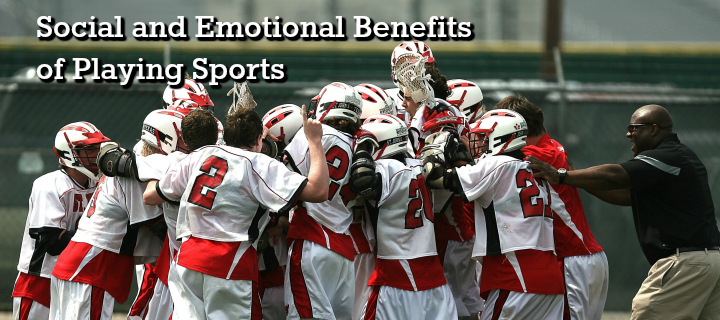- Job Seeker Resources
- |
- Last Updated: February 15, 2024

Social and Emotional Benefits of Playing Sports
 The physical health benefits of playing sports are countless. In addition to being entertaining, it’s scientifically proven that sports activities are good for your heart and your brain.
The physical health benefits of playing sports are countless. In addition to being entertaining, it’s scientifically proven that sports activities are good for your heart and your brain.
What’s rarely mentioned is that playing a sport can improve your social and emotional skills.
Social and emotional development for kids is important to prepare for the next phases of life like a career, family, and relationships. While house and school education are crucial for personal growth, playing sports is almost equally as important for social and emotional health.
It All Starts With Teamwork
A sports team cannot be successful without a joint effort to achieve a positive result. Good teamwork requires cooperation, coordination, and accountability of everyone on the team. The implementation of strategies and goals implies active participation of all team members to continuously work on improving team performance through organization and planning.
These are all skills that help develop the mind and solve problems in real time. Bottom line, playing sports will improve your teamwork and leadership skills.
Just think of the skills you develop by competing in sports that translate directly to your career:
- Communication
- Organization
- Rules and Structure
- Goals and Expectations
- Stamina
- Attitude
- Problem-solving
Moreover, conflicts are present in sports. When the conflict in sport is well managed, it can have many positive outcomes. Learning to manage and resolve conflict will prove essential in many aspects of life outside of sports, including work and family relationships.
Play Fair or Don't Play
Fair play is the main rule in any sport. While there will always be cheaters, it’s important to remember that fraudulent actions won’t result in a happy ending.
Unfair acts are punished and disapproved by society and other professionals. More importantly, they’re not easily forgotten. Sport encourages fair and rightful behavior. Honesty and fairness are respected and recognized qualities in life.
Anyone can be told 'cheating is bad' but living through it and feeling ostracized by competitors and teammates will leave an indelible mark on your psyche.
Learn Leadership Skills Early on in Life
Every sports team has a leader, sometimes it is a coach, other times it is a veteran player. Either way, they are powerful guides able to motivate a group of people to perform beyond their current capabilities.
This happens in individual sports as well, often leaning on a coach or trainer to help guide and motivate towards success.
Even if you aren't the current leader, being surrounded by these strong personalities able to change the feeling in a room has a positive effect on everyone, and can teach through action.
Respect the Rule of Law
Sports teach us to respect people and institutions that are above us like courts, laws, our boss or our parents.
While respecting authority is a good characteristic, respecting others is even more important. Respecting opponents is a central part of every game and great sportsmanship. Some biggest rivals in the history of the sport have nothing but praise for their opponents.
Good results take time, dedication, abstinence from life’s pleasures and hard work. That deserves tremendous respect from almost everyone. Respect others the way you want to be respected – this can be applied in all aspects of life.
Several studies have shown the correlation between sports participation and crime reduction. With no hobby or leisure activity, teens usually end up in the streets. That leads to alcohol, substance abuse and drugs, or even more severe crimes.
Sports keep kids occupied and in good company. While benefits of playing sport are abundant, sports can also indirectly improve community safety and create a better social environment.
Bonds for Life
The great social benefit of playing sports are all the new friendships you’re going to make. Some could even last forever.
It’s highly likely that you’ll make many friends for one main reason: you share the same passion for the same sport. You’ll always have something to talk about and remember good old days in the dressing room or on the playing field.
New friendships mean new connections and a bigger social circle and network, which again can translate to career success later in life.
Emotional and Psychological Benefits for Athletes
Sports can build your self-confidence.
Sure, there will be bad times when nothing is working out, and you feel like you want to give up -- not many things in life are easy. The important thing to remember is to work hard, and the results will slowly come.
Even the slightest result will improve your self-esteem. A first basket. A stop in a soccer game. A winning set. A tackle. All minor accomplishments that can lead to major feelings of positivity.
More importantly, you'll learn how to deal with loss. Life is one long path of victories and defeats, and you’ll know how to act in each situation.
Sports will keep you motivated more than anything else. Success is what drives and makes us go ahead. Goodwill and motivation are important for anything in life. The sport will teach you that in order to achieve a good result, you have to invest your time and other resources. If you're not motivated, then I'm afraid you won't make it long.
The Shoes on the Other Feet
Another emotional benefit of playing sports is empathy. Empathy means that we care about each other. In sports, teammates work as one. They support each other, they motivate each other, and they care about each other.
A healthy and stable team has a higher chance of success. The more you care for your teammates, the more likely you are to care about, and attempt to understand, people in general. When you have empathy you are better able to translate the world through someone else's viewpoint, not just your own. And with that ability comes great power to do good.
By participating in sports you’ll learn to control emotions - victory, defeat, happiness, disappointment. Sports are made from emotions. Over time, athletes learn how to control their emotions and act with thought, rather than impulse.
Life is one emotional roller-coaster. Sports can help you cope better with feelings.
Finally, a sport will make you feel happy. Even minimal physical activity can have a positive effect on happiness, studies say.
So be happy, play sports!
Sign In or Register to access all articles and insider tips for help in your job search.
Search for Sports Jobs
RELATED JOBS
Registered Dietitian (RDE Accepted) Pay Rate: Wages Starting at $30 and up go up based on...
Registered DietitianRegistered Dietitian (RDE Accepted) Pay Rate: Wages Starting at $30 and up go up based on...
Registered DietitianRegistered Dietitian (RDE Accepted) Pay Rate: Wages Starting at $30 and up go up based on...
Registered DietitianNow Hiring a Part-time Registered Dietitian Join Healthcare Services Group (HCSG) as a...
Registered DietitianRegistered Dietitian (RDE Accepted) Pay Rate: Wages Starting at $30 and up go up based on...
RELATED RESOURCES
Find the Right Job Faster
- Get personalized job matches sent to your inbox every day
- Connect directly with employers before your competition
- Advance your career with expert advice on interviewing, salary negotiation, and more
We value your privacy




